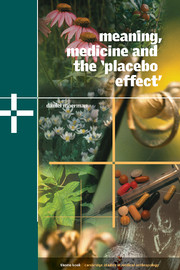Book contents
- Frontmatter
- Contents
- List of figures
- List of tables
- Acknowledgements
- Introduction: “Pickle ash” and “high blood”
- Part I The meaning response
- 1 Healing and medical treatment
- 2 The healing process
- 3 Measurement and its ambiguities
- 4 Doctors and patients
- 5 Formal factors and the meaning response
- 6 Knowledge and culture; illness and healing
- Part II Applications, challenges, and opportunities
- Part III Meaning and human biology
- References
- Index
6 - Knowledge and culture; illness and healing
Published online by Cambridge University Press: 05 June 2012
- Frontmatter
- Contents
- List of figures
- List of tables
- Acknowledgements
- Introduction: “Pickle ash” and “high blood”
- Part I The meaning response
- 1 Healing and medical treatment
- 2 The healing process
- 3 Measurement and its ambiguities
- 4 Doctors and patients
- 5 Formal factors and the meaning response
- 6 Knowledge and culture; illness and healing
- Part II Applications, challenges, and opportunities
- Part III Meaning and human biology
- References
- Index
Summary
The biomedical model of disease is so pervasive that we often fail to see it as such but view it as reality. Questioning this model is like asking whether a goldfish knows it is in water.
O'Boyle, 1993These sorts of things - from blue pills to lasers - are all things which we “know,” even though, like the goldfish, we may not realize that we know them. Much of our knowledge of the world is not an elicitation of what “is,” but rather it is a construction laid atop the world of experience. This is a very difficult concept for many people to grasp. The world that we see and experience seems so palpable and true, and our conceptualizations are so deeply entwined among themselves, that it just seems fantasy to say that the reality I perceive is largely metaphor and construction and is largely projected onto (rather than observed in) the world. These things are generally true, and they are true for many matters of health and medicine. This chapter may not convince a skeptic. But it may encourage the enquiring, and its goal is to make the strangeness of the placebo effect and the meaning response somewhat less strange. The price to be paid is that everything else gets rather more strange. C'est la vie.
Proper meals, clothing, pills
In the United States, we “know” that one eats (or, ought to eat) three meals a day; if you don't, your mother gets mad at you.
- Type
- Chapter
- Information
- Meaning, Medicine and the 'Placebo Effect' , pp. 67 - 86Publisher: Cambridge University PressPrint publication year: 2002



